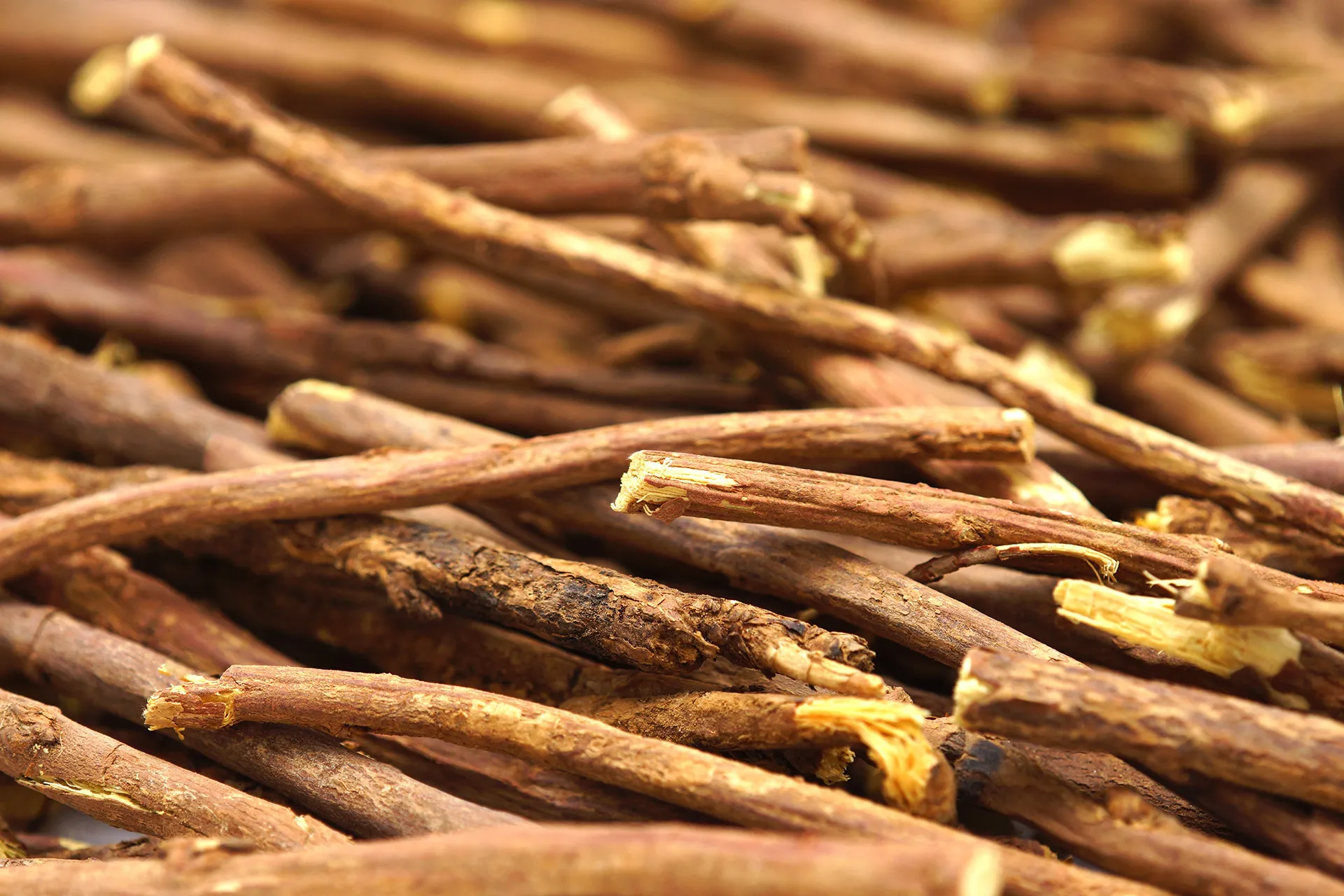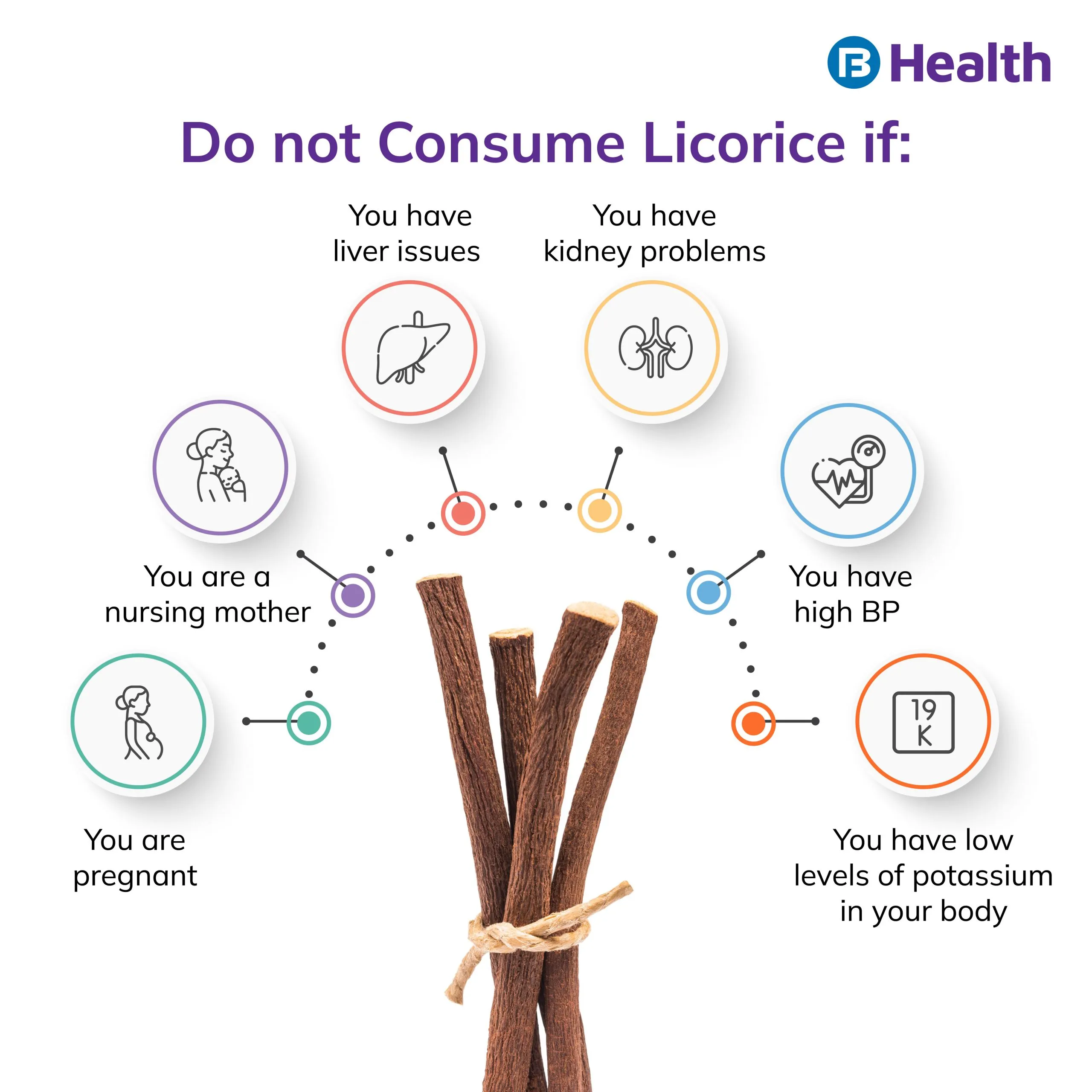Ayurveda | 8 min read
Licorice: Health Benefits, Side Effects and Precautions
Medically reviewed by
Table of Content
Key Takeaways
- Licorice has antiviral, antimicrobial, anti-inflammatory effects
- Licorice root benefits include treatment of skin conditions and peptic ulcers
- You can have it in the form of licorice powder, capsules, tablets, and more
The use of root of the licorice plant is one of the oldest and most popular herbal remedies. Since it has a sweet flavor, it is also widely used in drinks, candies, and certain medicines. Licorice root is used to treat heartburn, eczema, and ulcers. It is available in various forms such as licorice powder, tablets, capsules, and more. Read more on what is licorice and its health benefits.
Though licorice is generally safe, having too much of it can lead to severe side effects including poisoning. Read on to get a better understanding of licorice root benefits for your health and its side effects.

Licorice Root Benefits
Treats Skin Disease
Licorice has over 300 compounds that have antibacterial, antiviral, and anti-inflammatory properties. This makes it an effective remedy for skin infections caused by bacteria [1]. It can help you treat skin conditions such as acne, eczema, cellulitis, and impetigo. You can apply a topical gel that contains extract of licorice root to help manage eczema and acne.
Relieve GERD Quickly
Upset stomach, heart burn, acid reflux are common symptoms of indigestion that licorice can help manage and relieve. Having licorice capsules on a regular basis can significantly improve indigestion symptoms.
Other than this, it may also help ease gastroesophageal reflux disease (GERD). This includes symptoms like heartburn and acid reflux. Compared to antacids, daily use of licorice is more effective in relieving GERD and gastric irritation [2].
Additional Read: Digestive EnzymesProtects Against Cancer
Licorice offers antioxidant benefits. Due to this, licorice root extract can help protect you against certain forms of cancer. This is because of Licochalcone-A, a substance found in the extract. It helps effectively reduce the quantity of bcl-2, a protein that is drug resistant. Excess amount of bcl-2 is frequently associated with breast and prostate cancer and leukemia [3]. Apart from this, the extract can also help in treatment of oral mucositis. These are painful mouth sores that are a side effect of radiation and chemotherapy.
Treats Peptic Ulcer
Peptic ulcers are sores that form in your lower esophagus, stomach, or small intestine. These are generally a result of inflammation caused by H. pylori bacteria. Licorice root extract can help treat them because of glycyrrhizin present in it and its anti-inflammatory properties. Regularly consuming its extract with your standard treatment can reduce H. pylori [4]. Studies show that calculated doses can help better protect you against peptic ulcer than standard medicines [5].
Relieves Upper Respiratory Conditions
Due to its antimicrobial and anti-inflammatory effects, licorice tea and extract can help manage upper respiratory conditions. When added to regular treatment, glycyrrhizin can help you get relief from asthma. It can also help prevent post operative sore throat and strep throat [6].
Licorice root can help slow the progress of chronic bronchitis in people with COPD or chronic obstructive pulmonary disease. Asiatic, glycyrrhizic, and oleanolic acid found in the root have an antioxidant effect. These acids have a protective effect on bronchial epithelial cells [7].
Prevents Cavities
Among the many licorice root benefits, cavity prevention is one of them. Its root can protect against bacteria that causes tooth decay. Having lollipops containing licorice root can help significantly! They help by reducing the presence of cavity-causing bacteria [8].
Treats Hepatitis C
Glycyrrhizin can also help in hepatitis C treatment. This an infection that affects your liver. Without proper treatment, it can cause chronic inflammation and liver damage. Glycyrrhizin has antimicrobial and anti-inflammatory properties that makes it an effective treatment option against hepatitis C cells [9].
Here are other licorice root benefits for your health:
- Aids in diabetes
- Relieves symptoms of menopause
- Heals Canker sores
- Ease discomfort caused by functional dyspepsia
- Relieves symptoms of menstruation
- Helps in weight loss
Consult a doctor, dietician, or nutritionist to know what dose of licorice would be best for you. This can protect from the possible side effects of excess consumption. These side effects happen because high intake can lead to glycyrrhizin acid buildup. This may cause an increase in production of cortisol, a stress hormone. This can further lead to an imbalance in the electrolytes and fluids in your body.
The symptoms of these include:
- Edema (swelling and fluid retention)
- Muscle cramps or weakness
- Headache
- High blood pressure
- Fatigue
Licorice poisoning can lead to severe health conditions such as [10]:
- Cardiac arrest
- Pulmonary edema
- Paralysis
- Kidney failure
Uses of Licorice
Licorice is found in chewable pills, liquid extract, capsules, powder, and raw plant form. Many people today use licorice root to address conditions such as indigestion, acid reflux, heat flashes, coughs, and bacterial and viral illnesses. It is frequently accessible as a liquid or capsule substance.
Some of the medicinal benefits of licorice are as follows:
- To treat dermatitis, combine the plant with a skin-friendly gel, such as aloe vera gel.
- Liquid licorice extract can be added to drinks or taken sublingually as a therapy for ulcers, and loose plants can be steeped in hot water to create tea for sore throats. Liquid licorice pills and chewable tablets can also be taken.
- Using Licorice helps in weight loss by lowering the body mass index (BMI).
- Also, the antibacterial properties of licorice root may help prevent cavities.
Furthermore, licorice tea is said to relieve aching lips, while topical gels are said to cure skin conditions such as acne or dermatitis.
Also, licorice is used to flavour a variety of meals and drinks.
Surprisingly, many licorice sweets are flavored with anise oil, an essential oil derived from the anise plant (Pimpinella anisum) that has a comparable taste to licorice root.
Without first consulting a doctor, people should avoid consuming licorice-containing sweets, teas, or supplements for a prolonged length of time. If elevated blood pressure or insufficient potassium levels are a problem, DGL supplements are preferable to licorice.
Side Effects of Licorice

Licorice root is widely recognized by the Food and Drug Administration (FDA) as suitable for use in foods. The FDA does not, however, presently assess or confirm the efficacy, purity, or correctness of the supplement component.
Additionally, licorice root supplements and drinks are generally regarded as harmless for short-term use. Large amounts, however, may have negative effects, so people with specific medical problems may want to avoid licorice. This is usually caused by elevated amounts of the stress hormone cortisol brought on by prolonged or excessive consumption of glycyrrhizin.
When these situations are serious, they may result in arrhythmia, hypertension, and possibly even cardiac arrest.
Some of the side effects of over-dosages of licorice are:
Lower Amounts of Potassium
Too much licorice consumption can lower potassium levels. The following outcomes are possible in overconsumption:
- Irregular heartbeats
- Elevated blood pressure
- Swelling
- Lethargy
- Heart failure
Pregnancy Complications
Pregnant women should avoid consuming significant amounts of licorice or taking licorice root as a supplement.
Licorice intake during pregnancy may raise the chance of premature delivery. Glycyrrhizin intake during pregnancy can also have an impact on foetal growth.
Interaction With Other Drugs:
Licorice interacts with the following medications:
- Medicines that reduce blood pressure
- Water tablets, also known as diuretics
- Medication for irregular heartbeat
- Warfarin (Coumadin), osteogeny, hormone treatment, and birth control medications are all examples of blood thinners
- Corticosteroids
Right Dosage of Licorice
Licorice dose is determined by the disease that is being treated. Therefore, people should never ingest excessive quantities of licorice in food or as a supplement.
Glycyrrhizin buildup in your body can occur from chronic and high amounts of licorice root products.
Elevated glycyrrhizin levels have been linked to an excessive rise in the stress hormone cortisol, which can lead to fluid and electrolyte imbalances.
As a consequence, chronic and high doses of licorice root products can cause a variety of hazardous side effects, including:
- Potassium deficiency
- Blood pressure spikes
- Wasting of muscles
- Irregular heartbeats
Licorice toxicity is not uncommon. It can cause renal failure, congestive cardiac failure, or an overabundance of fluid in the lungs (pulmonary oedema).
Individuals with elevated blood pressure, congestive heart failure, kidney illness, or insufficient potassium levels should avoid glycyrrhizin-containing licorice goods entirely.
Precautions
If you consume more licorice root than is recommended, you may experience adverse effects.
Taking licorice root for an extended length of time or in excessive quantities may result in toxicity or deleterious effects. Although licorice root toxicity has only been documented in a few cases, it is real.
Some experts have categorized glycyrrhizin, the most potent substance in licorice root, as mildly toxic. This is primarily due to its capacity to induce elevated blood pressure and low potassium levels.
Never consume more licorice root than suggested to avoid toxicity or adverse effects.
To add licorice to your diet and avoid overconsumption, contact a doctor. To get doctor consultation with ease from the comfort of your home, book an appointment on Bajaj Finserv Health. You can talk to experienced and qualified doctors to resolve all your health concerns. You can also book various lab tests on the platform to know your health better.
References
- https://www.ncbi.nlm.nih.gov/pmc/articles/PMC3870067/
- https://search.informit.org/doi/10.3316/INFORMIT.950298610899394
- https://www.cancernetwork.com/view/licorice-root-extract-shows-antitumor-activity
- https://pubmed.ncbi.nlm.nih.gov/27614124/
- https://www.ncbi.nlm.nih.gov/pmc/articles/PMC4673944/
- https://www.ncbi.nlm.nih.gov/pmc/articles/PMC6783935/
- https://pubs.acs.org/doi/10.1021/acs.jafc.5b00102
- https://pubmed.ncbi.nlm.nih.gov/21108917/
- https://www.ncbi.nlm.nih.gov/pmc/articles/PMC3715454/
- https://www.ncbi.nlm.nih.gov/pmc/articles/PMC3498851/
Disclaimer
Please note that this article is solely meant for informational purposes and Bajaj Finserv Health Limited (“BFHL”) does not shoulder any responsibility of the views/advice/information expressed/given by the writer/reviewer/originator. This article should not be considered as a substitute for any medical advice, diagnosis or treatment. Always consult with your trusted physician/qualified healthcare professional to evaluate your medical condition. The above article has been reviewed by a qualified doctor and BFHL is not responsible for any damages for any information or services provided by any third party.
